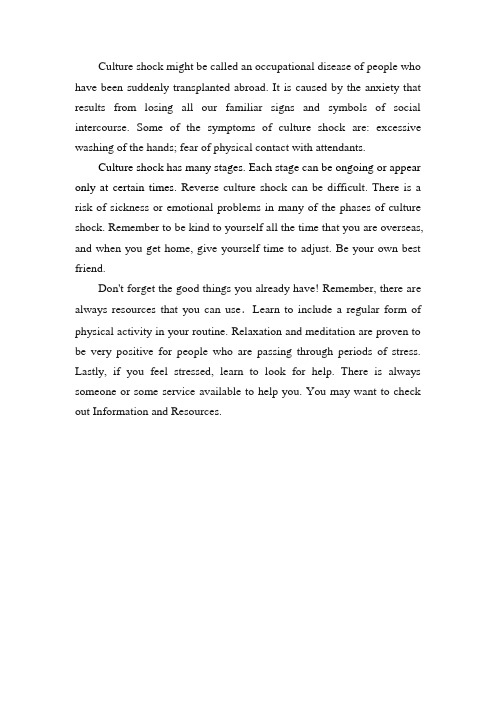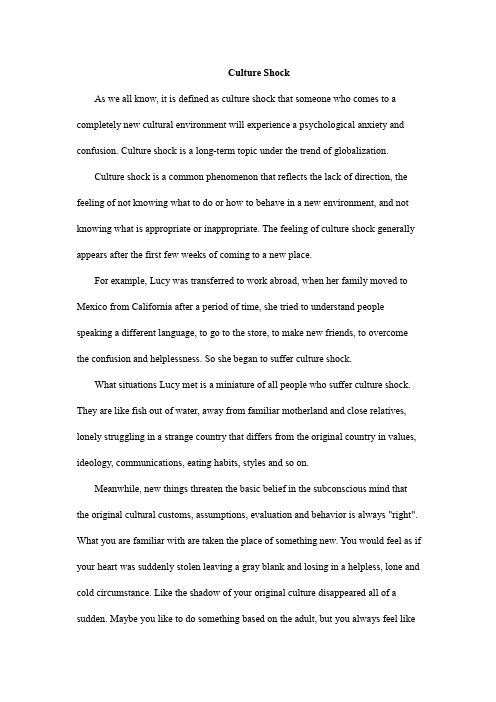Unit 20 Culture Shock 文化冲击(精品文档)
文化冲击 大学英语作文

Culture shock might be called an occupational disease of people who have been suddenly transplanted abroad. It is caused by the anxiety that results from losing all our familiar signs and symbols of social intercourse. Some of the symptoms of culture shock are: excessive washing of the hands; fear of physical contact with attendants.Culture shock has many stages. Each stage can be ongoing or appear only at certain times. Reverse culture shock can be difficult. There is a risk of sickness or emotional problems in many of the phases of culture shock. Remember to be kind to yourself all the time that you are overseas, and when you get home, give yourself time to adjust. Be your own best friend.Don't forget the good things you already have! Remember, there are always resources that you can use.Learn to include a regular form of physical activity in your routine. Relaxation and meditation are proven to be very positive for people who are passing through periods of stress. Lastly, if you feel stressed, learn to look for help. There is always someone or some service available to help you. You may want to check out Information and Resources.。
Culture_Shock

25
Some people suffer from culture shock even when they are in their own country, coming home after spending some time abroad. A similar adjustment period and its accompanying symptoms usually occur when a sojourner (旅居者)returns home. This is often called reverse culture shock.
gained some understanding of the new
14
15
People
begin to feel good because they have learned enough to understand the new culture. begin to feel at ease with what they meet and where they are. have successfully adjusted to the new culture, and feel proud of themselves for achieving the ability to live successfully in two cultures.
21
22
For the sake of entering the market in China, an American business delegation(业务代理人) arrived in China to sign a big contract with a Chinese company. The latter was so warm that they prepared an expensive welcome dinner for the delegation. The American delegation was shocked at what was served on the table: nice dishes of every kind, delicacies from land and sea. It was a banquet rather than a dinner. Then the delegation left for their own country the following day without signing any contract.Why??
CultureShock文化冲击

CultureShock文化冲击Culture Shock①DEFINING CULTURE SHOCK 定义Culture shock is a mental state(心理状态)that comes from the transition that occurs when you go from a familiar environment to an unfamiliar one and find that your old, established patterns of behavior are ineffective.culture shock can cause you to feel “out of sorts,”“fatigued(疲劳)” and “not wholly (完全的,全部的)in the moment.”②REACTIONS TO CULTURE SHOCK 反应prepared when you experience some of these reactionsAntagonism(对抗)toward the new environmentA sense of disorientation(方向,障碍,迷惑)Feelings of rejection(拒绝)Upset stomach and headachesHomesicknessMissing friends and familyFeeling a loss of status and influenceWithdrawal(撤退)Perceiving(感觉)members of the host culture to be insensitive(感觉迟钝,不友好)③THE STAGES OF CULTURE SHOCK (THE U-CURVE) (过程,步骤) You should view the stages as a U-shaped curve. “The U-curve depicts the initial optimism (乐观,乐观主义)and elation(兴高采烈,欢欣鼓舞) in the host culture, the subsequent dip(向下再向上)in the level of adaptation, and the following gradual recovery.Excitement Phase.The first phase, visualized(在脑海中使形象化,设想,想像)as the top of the left side of the U-curve(U曲线), is usually filled with excitement, hopefulness, as the individual anticipates being exposed to a new culture.Disenchantment(觉醒,清醒)Phase.This second phase begins when you recognize the reality of the new setting and some initial problems begin to develop.The second phase is a period when difficulties of language, inadequate schools for the children, poor housing, crowded transportation, chaotic shopping, and the like begintaking their toll.Beginning Resolution Phase.The third phase is characterized by gaining some understanding of the new culture. Here the person is gradually making some adjustments and modifications in how he or she is coping with the new culture. Events and people now seem much more predictable and less stressful. Effective Functioning Phase.In this final phase, at the top of the right side of the U-curve, the person now understands the key elements of the new culture (values, special customs, beliefs, communication patterns, etc.). One?s ability to live and function within two cultures (the old and the new) is frequently accompanied(陪伴)by feelings of elation and satisfaction.When this happens, the returnee experiences the same four phases of adjustment we discussed in the U-curve. This gives rise to the term “W-curve,” because it joins two U-curves together.④THE LESSONS OF CULTURE S HOCKOur discussion of culture shock was predicated on two premises.F irst, each year millions of people go abroad to work, travel, and study.Second, many of those experiences end up producing stress, homesickness, and confusion.A lthough we have placed the topic of culture shock under the category of “problems,” we would be remiss if we concluded our discussion without emphasizing the idea that culture shock can be an explicit learning experience.E xperiencing culture shock has a strong potential to make people bemulticulturalBeyond Culture ShockN ewcomers may not be ready to learn and practice social behaviors appropriate to the new culture in the initial period of settlement. It is not unusual for recent arrivals 。
文化冲击_culture_shock

4. Usually at this point in your adjustment to a new culture, you devise some defense mechanisms to help you cope and to protect yourself against the effects of culture shock. One type of coping mechanism is called “repression”. This happens when you pretend that everything is acceptable and that nothing bothers you. Another type of defense mechanism is called “regression”. This occurs when you start to act as if you are younger than you actually are; you act like a child. You forget everything, and
Main Idea
The first stage of culture-shock adjustment is “the honeymoon”.
随 笔 阅读技巧
Practice
课文
自测
Back
3. Eventually, however, the second stage of culture shock appears. This is “the hostility stage”. You begin to notice that not everything is as good as you had originally thought it was. You become tired of many things about the new culture. Moreover, people don’t treat you like a guest anymore. Everything that seemed to be so wonderful at first is now awful, and everything makes you feel distressed and tired. (Para. 3) Main Idea The second stage of culture shock, “the hostility stage”, eventually occurs.
Culture Shock文化冲击

Culture ShockAs we all know, it is defined as culture shock that someone who comes to a completely new cultural environment will experience a psychological anxiety and confusion. Culture shock is a long-term topic under the trend of globalization.Culture shock is a common phenomenon that reflects the lack of direction, the feeling of not knowing what to do or how to behave in a new environment, and not knowing what is appropriate or inappropriate. The feeling of culture shock generally appears after the first few weeks of coming to a new place.For example, Lucy was transferred to work abroad, when her family moved to Mexico from California after a period of time, she tried to understand people speaking a different language, to go to the store, to make new friends, to overcome the confusion and helplessness. So she began to suffer culture shock.What situations Lucy met is a miniature of all people who suffer culture shock. They are like fish out of water, away from familiar motherland and close relatives, lonely struggling in a strange country that differs from the original country in values, ideology, communications, eating habits, styles and so on.Meanwhile, new things threaten the basic belief in the subconscious mind that the original cultural customs, assumptions, evaluation and behavior is always "right". What you are familiar with are taken the place of something new. You would feel as if your heart was suddenly stolen leaving a gray blank and losing in a helpless, lone and cold circumstance. Like the shadow of your original culture disappeared all of a sudden. Maybe you like to do something based on the adult, but you always feel likean ignorant child. In the end, you would become vulnerable, frustrated, upset, irritable, may also suffer from homesickness and depression.Culture shock and change in degree depends on the following conditions: firstly, the length of your stay. The longer time you stay in a strange atmosphere, the more serious shock you will stand. Secondly, the purpose of your trip. If you travel as tourists or for business, either temporary living in another country, perhaps you can’t be interrupted by culture shock, on the contrary, you can enjoy different meaningful journey. Thirdly, degrees of contact between the local culture and the new culture have a significant effect on your feeling including happiness, sadness. One example is that Bush paid China a visit and he may be welcome by many of Chinese, companied with some American officials, besides he lived only few days, so he needn’t concern about what culture shock is.The consequence of culture shock is obvious and predictable. If you can’t handle the culture shock in a positive way, you probably become victims of cultural differences, which destroy your most important business relationship, cause friction, even break you dream. You stay away from the crowd, and you cry, you're angry; by day you are drowsy, but can’t sleep at night. At the same time, it’s effective to your career and makes you lack of sense of accomplishment. Individual cases, culture shock can lead to serious depression and personal problems.There are some reasons for shock that we can seek methods available to overcome shock and thereby enhance our strength and reduce weakness. Firstly, someone is addicted to original culture and seldom broadens their horizons, as aresult, he isn’t sensitive to what different matters he will meet. Secondly, with heavy burdensome works on the shoulder, one who has one's hands full can hardly fit in with a quite fire-new culture because of lack of energy or time. Thirdly, as an essential reason, the basic differences of the culture lead one difficult to entirely comprehend and grasp the core of a culture in terms of its language, values, brief and so forth. Furthermore, taking China culture and America culture for example, it’s acknowledged that America which consists of external culture has only several hundred years while China is a profound ancient country with a brilliant history, gestating countless wonders in arts, science. No matter what a Chinese or an American goes to the other country, he will make necessary adjustments to blend into a brand-new circle.There is a typical case for differences in culture leading unnecessary misunderstanding. Professor Wang had written a book on Chinese but knew a little English. Last year he got to know an American professor Johnson who was to learn Chinese culture in a seminar. One day before professor Johnson went back to America, he decided to give him his book as a gift. Prof.Wang said to Prof.Johnson that this was a clumsy book written by your humble servant. Prof.Johnson was confused that who his humble servant was and he thought Prof.Wang was kidding.In the example above, the problem is the use of clumsy book and humble servant. Since Professor Wang didn’t know American culture quite well, he was being polite by belittling himself in perfect Chinese way. However, this is not American politeness. In American, people would always try to be self-confident but not belittle themselves.Self-abnegation as lacking confidence and thus would be shrugged off.Therefore, how to deal with culture shock placed in front of us. You have to start or at least recognize that you can appreciate some aspects of this culture. This is the beginning of your acceptance of new culture and learning to adapt.Seeking someone who can help you or in the same situation as same as you. They can provide you a spiritual support, and can help you in their daily work. An English lady Lisa, moved to France, through her daughter's school to know a lady who took her to the shop, and buy some necessities. Her colleague Kitty visited her on every Sunday, taught her French and how to use various appliances. She also participated in a name of "foreign women in charge", which was a professional group that had 150 women like her.Overcoming communicative obstacles can help you suit the situation as soon as possible. For you and your family, fluent in foreign language is to improve yourself-confidence at work and provide convenience in life so that they can enter the local community "insiders" and reduce the sense of alienation and isolation. Although you may think that it wastes valuable time communicating with others, it’s in fact, not only reinforcing both loyalty, but also exchanging useful information.Taking care of yourself. Taking time out to relax and physical exercise, and eating healthy food, writing down your daily feelings and experiences are also very useful methods for you to suit the culture shock. Besides, taking part in good social activities and enjoying leisure time also help you. Maybe you would meet something unhappy, in that case, you usually have two choices: anger or self-ridicule. Whatbetter way to feel it? Try to keep your sense of humor and to be a gentle man or a refined lady.However, some people are worried that they may well be a loser in the front of shock. In fact, culture shock is not a monster but impressive only in appearance, as a result, we can totally adapt it. According to a research coming from Harvard University, even if 2.5% people who have suffered shock surrender to it, almost 97.5% people can beat it and walk on the appropriate path in life finally. 20% of these people choose a suitable way when they first come across the shock, nevertheless, remaining 80% people find correct paths via a long formidable approach. They put up with countless obstacles, being undaunted by repeated setbacks, eventually see the sunrise.There is a great delight that adapting to culture shock is a process of growing better and excellent. If you are over the hurdle of culture shock, you will learn many new skills that will bump up your capacity and broaden your horizon. Your basic perception will also change. You will become more independent, flexible and more adaptable, very satisfied with the new experience, take more responsibility, identify your own style of doing things, learn a new culture of knowledge, abandon the perspective using the trial and acts of intolerance of others, achieve the established objectives, improve the organization and communication skills.Through the culture shock, you will find that your vision is more wide - from politics to food, from culture to body language, from work habits to communication with people. You have mch confidence. You will learn more new knowledge andexperience. You will be eager to return to the motherland and your friends, family and colleagues to share everything you have learned.All in all, as a modern, the confusion and disorientation of culture shock are necessary steps in learning about a new culture. If everything in the new place is just like home, no learning will come from being there. With the growing trend of globalization there are increasing contacts between cultures. That means more culture shock we will suffer. But we shouldn’t be afraid of it. On the contrary, we should have an open-mind and positive attitude facing it, learning what we need to create our bright life.1. What are the differences in addressing people between Chinese and English cultures?In China, it is considered to be polite and respectful to address a Chinese people by his/her surname, followed by honorific titles like 先生(xiān sheng) (Sir), 女士(nǚshì) (Madam) or the job position. Given names are often called between g ood friends. The following is the general way to address various Chinese people.Mr. zhang: 张先生(zhāng xiān sheng)Ms. Wang: 王女士(wáng nǚ shì)Manager Ma:马经理(mǎ jīng lǐ)President Li: 李主席(lǐ zhǔ xí)Minister Liu: 刘部长(liú bù zhǎng)In English, at informal situations, it is usual for people meeting for the first to use first names straight away, regardless of any difference in ages or status. Some titlesare given below: Mr, Mrs, Miss, Ms, Sir, Madam and so on. And you can call your relatives’ name.2. What is the cultural assumption? Please give an example to illustrate your point.Cultural assumption is pretty obvious that people are more likely to believe things if the people around them believe the same thing.In India, the vast majority of people are Hindus. This means, among other things, that they believe that when we die we are reincarnated. Hindu has been the dominant religion in this area for something like 4000 years. In the Americas, Europe, and Africa there are relatively few Hindus. It cannot be an accident that so many Hindus are concentrated in a particular region. When people there form their religious beliefs, they are heavily influenced by the people around them. If people picked their religion mainly by criteria independent of the people around them, an American should be just as likely to choose Hinduism as an Indian, and an Indian should be just as likely to choose Christianity as an American.。
Culture_shock 文化冲击

What is Culture Shock?
◆Why? Smells, sounds, flavors, the very feeling of the air one is breathing; the natives unfamiliar language and behavior contribute to it, too. ◆People's response to culture shock : vary greatly, from excitement and energetic action to withdrawal, depression, physical illness, and hostility. ◆Keep in mind : First, most people experience some degree of culture shock when they go to a new country. Second, culture shock passes with time.
The Film: Pushing Hands (1992)
The debut film of director Ang Lee, who cowrote the script with James Schamus. Concerns with family and duty and how the two co-exists, for better or worst.
Culture Shock
文化冲击 PPT课件

4-17 17
提供出国前培训
• 进行跨文化培训的一条有效途径就是先 要发掘人们是如何调整进而适应新文化 的。 • 学习与影响全球经理人培训项目成败相 关的原则可以分三步:观摩东道国国民 的行为举止、记忆学习到的内容、反复 练习这些新的行为举止直到感觉自然。
4-18 18
跨文化培训方法
• 智力模型-也称作课堂模式,即参与 者通过讲座、小组讨论和录像等各 种不同的教学方法获取有关东道国 的信息。 • 培训区模型-也叫仿真模型,注重情 感目标、文化专有内容和体验过程。
4-13 13
选拔外派人员
• 慎重挑选外派人员对提高外派成功率十 分重要。 • 当在不熟悉的文化环境中工作时,个人 所需的资质包括适应性、灵活性、同理 心和耐受力。 • 同时,良好的人际沟通能力和高度自尊 心也很重要。
4-14 14
选拔外派人员
• 候选人是否具备协作精神、易于相处并 且善解人意? • 候选人是否能够虚心接受他人的意见? • 候选人是如何应对新情况的,以及他为 理解和接受差异做出了怎样的努力? • 候选人是否了解他自身在文化层面衍生 出的价值观念? • 候选人是否足够敏锐并能够了解其他文 化的价值观?
4-19 19
跨文化培训方法
• 自我感知模型-也叫人际关系模型, 它是基于这样一种假设:具备自我 认识能力的学员将会更好地适应新 文化,因此也可以更有效地开展海 外工作。 • 文化感知模型-强调文化洞察力。
4-20 20
跨文化培训方法
• 交互方法-基于参与者与东道国国民 或曾在东道国居住较长时间的美籍 人士之间的相互交往。 • 多维方法-基于这样一种理念:使用 任何一种单一的培训方法都不如尝 试将认知、情感、行为等方面的培 训方法相结合更有效率。
Culture_shock_文化冲击

Culture Shock
Firstly, I want to share with you a short story:
There was a Chinese man in America for the first time to earn money, and after he had learned little English, he went to rent house alone. There he said in Chinglish: “I eat you Байду номын сангаасsleep you, how much a week?”(我吃你的,住你,多少钱一个月) Surely ,the house lady was shocked by his word and felt embarrassed.
Thanks you!
Conclusion
Culture shock is not fearful, what is fearful is we lack of the courage to overcome it.
If you stay calm, observe and learn, and keep things in perspective, you'll probably find that your difficulties will pass.
- 1、下载文档前请自行甄别文档内容的完整性,平台不提供额外的编辑、内容补充、找答案等附加服务。
- 2、"仅部分预览"的文档,不可在线预览部分如存在完整性等问题,可反馈申请退款(可完整预览的文档不适用该条件!)。
- 3、如文档侵犯您的权益,请联系客服反馈,我们会尽快为您处理(人工客服工作时间:9:00-18:30)。
Unit 20 Culture ShockKalvero Oberg1 Culture shock might be called an occupational disease of people who have been suddenly transplanted abroad. Like most ailments, it has its own symptoms and cure.文化冲击又叫人们移居国外的职业病。
像大多数小病一样,它也有自己的症状和治疗方法。
2 Culture shock is precipitated by the anxiety that results from losing all our familiar signs and symbols of social intercourse. Those signs or cues include the thousand and one ways in which we orient ourselves to the situation of daily life: when to shake hands and what to say when we meet people, when and how to give tips, how to make purchases, when to accept and when to refuse invitations* when to take statements seriously and when not. These cues, which may be words, gestures, facial expressions, customs, or norms, are acquired by all of us in the course of growing up and are as much a part of our culture as the language we speak or the beliefs we accept. All of us depend for our peace of mind and our efficiency on hundreds of these cues, most of which we do not carry on the level of conscious awareness.文化冲击是焦虑产生的,这种焦虑是由于丧失了指导我们进行社交的熟悉的信号和符号。
这些信号和暗示包含了许许多多使我们适应日常生活情况的方法:何时握手,当我们见到人时说什么,何时怎样给小费,怎样购物,何时接受何时拒绝邀请,何时把别人的话当真,何时不。
这些暗示也许是词语,手势,面部表情,风俗习惯或者规范,这些都是我们在成长过程中学习得来的,它们跟我们所讲的语言,所接受的信条一样,是我们文化的一部分。
我们所有人都依靠这些暗示来获得平静的心情以及高效的生活,而这些暗示的大多数并不是有意识地记住的。
3 Now when an individual enters a strange culture, all or most of these familiar cues are removed. He or she is like a fish out of water. No matter how broad- minded or full of goodwill you may be, a series of props have been knocked from under you, followed by a feeling of frustration and anxiety. People react to the frustration in much the same way. First they reject the environment which causes the discomfort. “The ways of the host country are bad because they make us feel bad." When foreigners in a strange land get together to grouse about the host country and its people, you can be sure they are suffering from culture shock. Another phase of culture shock is regression. The home environment suddenly assumes a tremendous importance. To the fore18ner everything becomes irrationally glorified. All the difficulties and problems areforgotten and only the good things back home are remembered. It usually takes a trip home to bring one back to reality.当一个人进入一个陌生的文化,所有或大多数的暗示消失了。
他或她像是离开水的鱼。
不管你是多么心胸开阔或者充满友善,你的一系列精神支柱从你身下被抽走,随之而来的是挫败感和焦虑。
人们对焦虑的反应大都是相同的方式。
首先,他们抵制引起不适的环境。
“东道国的习俗不好,因为他们让我感到很糟糕。
”当生活在异国他乡的外国人聚到一起抱怨东道国和它的子民时,你可以确定他们正在遭受文化冲击带来的痛苦。
另一个文化冲击的阶段是回归。
家庭环境突然变得极为重要。
对外国人来说,家中的一切都被不合逻辑的美化了。
所有的困难和问题都将被遗忘,只记得家中美好的事情。
这通常需要回家一趟,才能把他们带回现实中来。
4 Some of the symptoms of culture shock arc excessive washing of the hands, excessive concern over drinking water, food dishes, and bedding; fear of physical contact with attendants, the absent-minded stare; a feeling of helplessness and a desire for dependence on long term residents of one's own nationality; fits of anger over minor frustrations; great concern over minor pains and eruptions of the skin; and finally, that terrible longing to be back home.文化冲击的一些症状是过多的洗手,过多担心饮用水,食物,和床具;害怕亲自与服务员接触,心不在焉的眼神;无助的感觉和渴望依靠来自本国的长期居住者;因为一点点挫折大动肝火;对轻微疼痛和皮疹的担心;最后,极为渴望回家。
5 Individuals differ greatly in the degrees in which culture shock affects them. Although not common, there are individuals who cannot live in foreign countries. However; those who have seen people go through culture shock and on to a satisfactory adjustment can discern steps in the process. During the first few weeks most individuals are fascinated by the new. They stay in hotels and associate with nationals who speak their 1anguage and are polite and gracious to foreigners. This honeymoon stage may last from a few days or weeks to six months, depending on circumstances. If one is very important, he or she will be shown the show places, will be pampcred and petted, and in a press interview will speak glowingly about goodwill and international friendship.个人受文化冲击的程度大不相同。
尽管这样的现象不普遍,但确实有人不能生活在国外。
然而,那些看过人们经历文化冲击到令人满意的适应过程的人,却能辨认出该过程的各个阶段。
在最初的几个星期,大多数人都被新鲜感感到着迷。
他们待在酒店里,与讲自己国家语言的人交往,并且对外国人礼貌和善。
这个蜜月期将持续几天或者几个星期到6个月,依情况而定。
如果这个人是重要人物,他将会被安排游览胜地,受到纵容和宠爱,在新闻采访中,他会热情洋溢地谈论友善和国际友谊。
6 But this mentality does not normally last if the foreign visitors remains abroad and has seriously to cope with real conditions of life. It is then that the second stage begins, characterized by a hostile and aggressive attitude towardthe host country. This hostility evidently grows out of the genuine difficulty which the visitor experiences in the process of adjustment. There are house troubles, transportation troubles, shopping troubles, and the fact that people in the host country are largely indifferent to all these troubles. .They help, but they don't understand your great concern over these difficulties. Therefore, they must be insensitive and unsympathetic to you and your worries. The result, “I just don't like them.” You become aggressive, you band together with others from your country and criticize the host country, its ways, and its people. But this criticism is not an objective appraisal. Instead of trying to account for the conditions and the historical circumstances which have created them, you talk as if the difficulties you experience are more or less created by the people of the host country for your special discomfort.但是这种精神状态不会持续,如果外国造访者仍然留在国外,并且开始认真地对待真实的生活状况。
